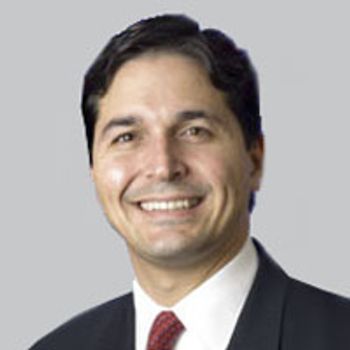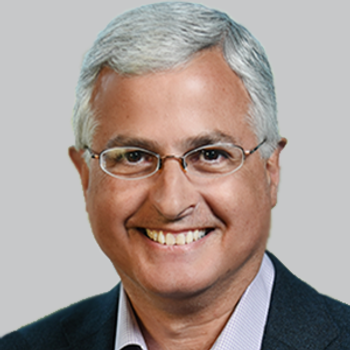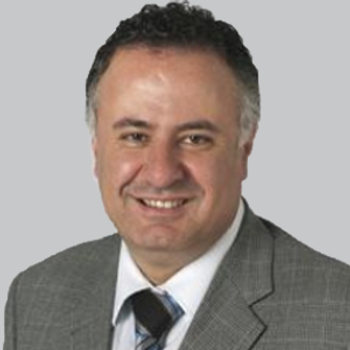
The neurologist and epileptologist at the Mayo Clinic in Jacksonville discussed when to best perform routine EEG in patients with epilepsy.

The neurologist and epileptologist at the Mayo Clinic in Jacksonville discussed when to best perform routine EEG in patients with epilepsy.

This investigation has suggested that Porphyromonas gingivalis may be a driver of Alzheimer disease progression and that an investigational bacterial protease inhibitor may be able to prevent that sequence.

The novel myeloperoxidase inhibitor was previously licensed by AstraZeneca, but its development has since been taken over by Biohaven, which received IND acceptance from the FDA.

Axovant Sciences has announced that, in addition to receiving positive feedback from the FDA on its clinical development, it is expecting data from the first 2 patients dosed to read out in March 2019.

A 67-year-old woman presents with symptoms of symptoms of daytime fatigue and sleeplessness at night due to excessive nighttime movements over the course of three months. Her husband is concerned that she could be having seizures.

The director of the Center for Neurodegeneration and Translational Neuroscience and director emeritus, Cleveland Clinic Lou Ruvo Center for Brain Health, shared thoughts on his hope for the future of Alzheimer disease, among other topics.

The Anne Parrish Titzell Professor of Neurology and Neuroscience at Weill Cornell Medicine’s Feil Family Brain and Mind Research Institute discussed how to make the decision about who will end developing Alzheimer and who will not when amyloid buildup occurs.

We are very pleased to welcome Heidi Moawad, MD as the first ever Editor in Chief of our journal, beginning February 1, 2019.

Overall, there were no statistically significant or clinically relevant effects of bedtime administration of lemborexant on next-morning driving performance in healthy adult and elderly volunteers.

The regulatory agency has informed Cytokinetics that the use of the 6-minute walk test will be an acceptable efficacy outcome measure for the skeletal muscle troponin activator.

The professor of neurology at VCU spoke about the possibility of pairing gene therapies for Huntington disease down the line when they are available.

A planned phase 1/2 trial of the recombinant AAV5 vector treatment is expected to begin dosing patients in the second half of 2019.

The director of the Epilepsy Center at Cleveland Clinic spoke about the use of deep brain stimulation for the treatment of refractory epilepsy, and who the ideal candidate is for implantation.

The director of the Center for Neurodegeneration and Translational Neuroscience and director emeritus, Cleveland Clinic Lou Ruvo Center for Brain Health, spoke about the emerging therapies and biomarkers in Alzheimer disease.

Who knew those animated little fish might do so much more for our patients with neurodevelopmental disorders than provide a calm diversion in the waiting room?

The attending neurologist at Brigham and Women's Hospital spoke about data from an analysis that concluded that women with frontal lobe epilepsy are more likely to experience a worsening of their seizure frequency during pregnancy.

Several network meta-analyses have suggested that ocrelizumab is superior or comparable in its efficacy and safety to the other 14 available disease-modifying therapies in treating relapsing multiple sclerosis.

The director of the MedStar Georgetown University Hospital Headache Center discussed the importance of understanding the biologic mechanisms of migraine for patients and providers.

The pediatric epileptologist at Nicklaus Children’s Hospital discussed the long-term seizure freedom data that looked at the effectiveness of perampanel which demonstrated a gratifying response in seizure control for patients with secondarily generalized seizures.

The neurologist and epileptologist at the Mayo Clinic in Jacksonville spoke about how to best identify adult patients in need of routine EEG and what it will bring to the table relative to the clinician.

The director of the University of Florida’s Tourette Association of America Southeast Regional Center of Excellence spoke about the potential targets for neuromodulation and the progress that has been made with DBS in Tourette.

A recent review of the ICER report on calcitonin gene-related peptide inhibitor monoclonal antibodies has suggested that due to their cost and comparative benefit to available treatments, they should be reserved as second-line treatments.

Neurology News Network for the week of January 19, 2019.

The Director of the Pediatric Epilepsy Center at UCSF Benioff Children's Hospital spoke about what defines a "clinically meaningful change in seizure frequency" using data from a phase 3 clinical trial of ZX008 for the adjunctive treatment of seizures associated with Dravet syndrome.

Uliel-Sibony discussed her and her colleagues' study of CBD, and its findings on when tolerance develops for which patient population.

This is the first biomarker evidence that peripherally administered exenatide may both engage and normalize brain insulin signaling in association with the activation of Akt and mTOR cascades in Parkinson disease.

The executive director of the University of Rhode Island’s George & Anne Ryan Institute for Neuroscience spoke about the phase 1 trial and the years of research that led to it.

The professor and vice chair of the neurology department at UCLA discussed the new VNS, RNS and DBS CPT codes for 2019.

The Clinical Fellow in Neurophysiology and Epilepsy at Massachusetts General Hospital spoke about the implications of this assessment of SUDEP.

The director of Parkinson’s Disease and Movement Disorders Program at Henry Ford Hospital spoke about how improving levodopa delivery systems, among other advancements, has progressed the treatment of the disease.